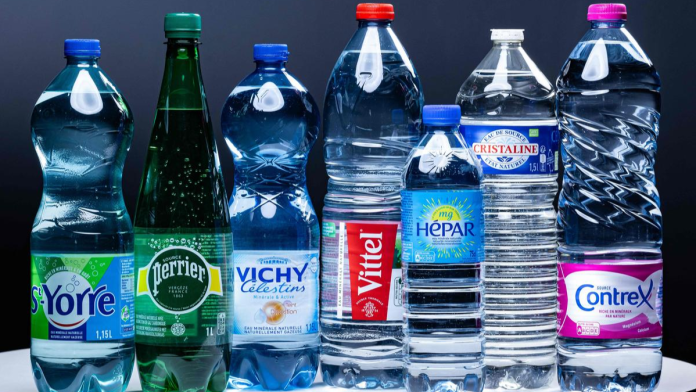🕒 Last updated on August 12, 2025
A new investigation in France has revealed disturbing levels of microplastic contamination in two well-known bottled water brands.
Investigators find pollution levels in mineral water brands
The brands, sold under the names Contrex and Hépar, are produced by Nestlé Waters and are widely marketed as healthy, mineral-rich drinks.
The waterways were thoroughly tested by French environmental authorities. They discovered that the bottles contained microplastic concentrations far beyond what scientists normally find in rivers, lakes, or even underground water sources. In fact, the levels detected in these bottles were up to 1.3 million times higher than in natural surface waters.
For Hépar, tests found about 2,096 microplastic particles per liter. Contrex samples contained about 515 particles per liter. To put this into perspective, unpolluted water bodies often have only a few particles per cubic meter, meaning the bottled water was far more contaminated than many natural water sources.
🧱 Finland builds world’s largest sand battery — and it’s heating homes without oil or pollution
Authorities believe the contamination is linked to large, illegal dumps of plastic waste near the water sources. These sites have been in use for decades and contain hundreds of thousands of cubic meters of discarded bottles and other plastic debris.
Illegal dumps close to water wells
The French Office for Biodiversity and the Central Office for the Fight against Environmental and Public Health Offenses undertook the inquiry. Their findings point to four major waste dump sites in the Vosges region of France.
They-sous-Montfort, Saint-Ouen-les-Parey, Crainvilliers, and Contrexéville are the locations. Combined, they hold an estimated 473,700 cubic meters of plastic waste. This is roughly equal to 126 Olympic-sized swimming pools filled with plastic trash.
Many of the waste piles are located dangerously close to the wells that supply water for Contrex and Hépar. The investigators believe the close proximity has allowed microplastics to seep into the water sources over time.
The dumps were used for many years without proper authorization. While some of the waste dates back decades, investigators found that a large amount consisted of discarded Nestlé plastic bottles. Some sites have been cleaned in recent years, but the authorities say that contamination risks remain high.
Company denial and upcoming trial
Despite the findings, Nestlé Waters strongly rejects the accusations. The company says that independent laboratory tests show its bottled water is safe to drink. It also claims that no proven link has been established between the waste dumps and the water contamination.
🌊 Freshwater Vanishing at Alarming Speed — Four Mega-Regions Face Collapse
Nestlé has also argued that some of the illegal dump sites existed before it became the owner of the land. The company says it has taken steps to clean up certain areas and improve waste management.
However, French prosecutors have moved forward with legal action. On November 24 and 28, 2025, Nestlé Waters will go on trial in the city of Épinal. The charges relate to the illegal disposal of waste.
Environmental groups have been closely following the case. They argue that bottled water companies should be held accountable for any pollution linked to their production and packaging. The revelations have also added to public concerns about the bottled water industry, which has already faced criticism for over-extracting water, generating plastic waste, and contributing to greenhouse gas emissions through packaging and transport.
For many French consumers, the news has come as a shock. Both Contrex and Hépar have been promoted for years as premium health waters. The idea that they may contain thousands of tiny plastic particles is unsettling for people who have trusted the brands for their supposed purity.
Authorities have warned that microplastics can enter the human body through drinking water. Once inside, they may reach the bloodstream, organs, and even the brain. While the full health effects are still being studied, experts believe the particles can cause harm over time.
This case now stands as one of the most significant environmental controversies in France in recent years. With the trial date set, both the bottled water industry and consumers will be watching closely to see how the evidence is presented in court.

